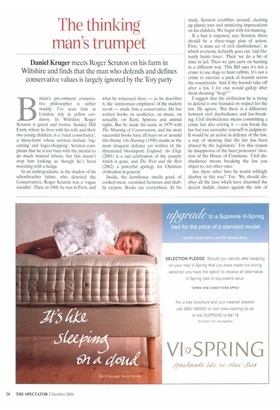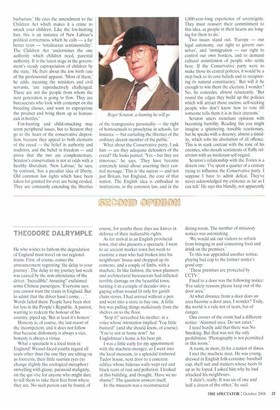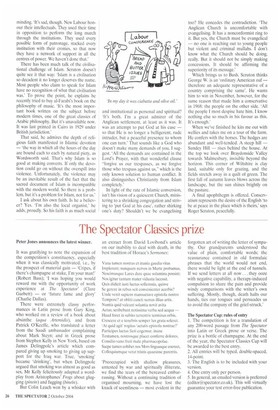The thinking man's trumpet
Daniel Kruger meets Roger Scruton on his farm in Wiltshire and finds that the man who defends and defines conservative values is largely ignored by the Tory party
ritain's pre-eminent conservative philosopher is rather muddy. I've seen him in London, tidy in yellow corduroy. In Wiltshire Roger Scruton is green and brown. Sundey Hill Farm, where he lives with his wife and their two young children, is a 'rural consultancy', a `meta-farm' whose services include 'logcutting' and `logic-chopping'. Scruton complains that he is too busy with the mental to do much manual labour, but this doesn't stop him looking as though he's been wrestling with a hedge.
As an undergraduate, in the shadow of his schoolteacher father, who detested the Conservatives, Roger Scruton was a 'vague socialist'. Then, in 1968, he was in Paris, and
what he witnessed there — as he describes it, the `antinomian emptiness' of the student revolt — made him a conservative. He has written books on aesthetics, on music, on sexuality, on Kant, Spinoza and animal rights. But he made his name in 1979 with The Meaning of Conservatism, and his most successful books have all been on or around this theme. On Hunting (1998) stands as the most eloquent defence yet written of the threatened bloodsport; England: An Elegy (2001) is a sad celebration of the country which is gone, and The West and the Rest (2002) a powerful apology for Christian civilisation in general.
Inside, the farmhouse smells good, of cooked meat, varnished furniture and shabby carpets. Books are everywhere. In his study, Scruton scrabbles around, clearing up plastic toys and muttering imprecations on his children. We begin with fox-hunting.
If a ban is imposed, says Scruton, there should be a three-stage plan of action. First, 'a mass act of civil disobedience', in which everyone defiantly goes out 'and blatantly hunts foxes'. Then 'we do a bit of time in jail. Then we just carry on hunting in a different way. This Bill says it's not a crime to use dogs to hunt rabbits. It's not a crime to exercise a pack of hounds across the countryside. And if the hounds take off after a fox, I for one would gallop after them shouting "Stop!"' I suggest that the civilisation he is trying to defend is one founded on respect for the law. He agrees. 'But there is a difference between civil disobedience and law-breaking. Civil disobedience means committing a crime but also solving it — you break the law but you surrender yourself to judgment. It would be an action in defence of the law, a way of showing that the law has been abused by the legislators.' For this reason he disapproves of the hunt protesters' invasion of the House of Commons. 'Civil disobedience means breaking the law you object to, not other ones.'
Are there other laws he would willingly disobey in this way? Yes. 'We should disobey all the laws which have disarmed the decent middle classes against the tide of barbarism.' He cites the amendment to the Children Act which makes it a crime to smack your children. Like the fox-hunting ban, this is an instance of New Labour's political correctness, which he calls — a far better term — 'totalitarian sentimentality'. The Children Act 'undermines the one authority which children need, parental authority. It is the latest stage in the government's steady expropriation of children by the state.' He frets about the low birth rate of the professional apparat. 'Most of them,' he adds, meaning the ministers and civil servants, 'are reproductively challenged. These are not the people from whom the next generation is going to flow. They are bureaucrats who look with contempt on the breeding classes, and want to expropriate the product and bring them up as homunculi in bottles.'
Fox-hunting and child-smacking may seem peripheral issues, but to Scruton they go to the heart of the conservative disposition, because they appeal to both elements of the creed — the belief in authority and tradition, and the belief in freedom — and prove that the two are complementary. Scruton's conservatism is not at odds with a healthy liberalism. 'New Labour,' he says, by contrast, 'has a peculiar idea of liberty. Old common law rights which have been taken for granted for ever are being eroded. They are constantly extending the liberties of the transgressive personality — the right of homosexuals to proselytise in schools, for instance — but curtailing the liberties of the ordinary decent member of the public.'
What about the Conservative party, I ask him — are they adequate defenders of the creed? He looks pained. 'Yes – but they are timorous,' he says. 'They have become extremely timid about asserting their central message.' This is 'the nation — and not just Britain, but England, the core of that nation. The English idea is embodied in institutions, in the common law, and in the 1,000-year-long experience of sovereignty. They must reassert their commitment to this idea, as people in their hearts are longing for them to do.'
Two issues stand out. 'Europe — our legal autonomy, our right to govern ourselves', and 'immigration — our right to control our own borders, and to demand cultural assimilation of people who settle here. If the Conservative partywere to make those its central policies, it would be a step back to its core beliefs and to recapturing its natural constituency.' But will it be enough to win them the election. I wonder? No, he concedes, almost reluctantly. `But round the edges they build up the policies which will attract those useless, self-seeking people who don't know how to vote till someone tells them it is in their interests.'
Scruton utters trenchant opinions with becoming humility. Reading this you might imagine a spluttering, irascible reactionary, but he speaks with a decency, almost a timidity, which robs his absolutism of all offence. This is in stark contrast with the tone of his enemies, who mouth sentiments of fluffy relativism with an intolerant self-regard.
Scruton's relationship with the Tories is a distant one. 'I've spent a quarter of a century trying to influence the Conservative party. I suppose I have to admit defeat. They've never acknowledged my existence as far as I can tell.' He says this blandly, not apparently minding, It's sad, though. New Labour honour their intellectuals. They used their time in opposition to perform the long march through the institutions. They used every possible form of patronage, stacked every institution with their cronies, so that now they have a network of support in all the centres of power. We haven't done that.'
There has been much talk of the civilisational challenge of Islam. Sermon doesn't quite see it that way: 'Islam is a civilisation so decadent it no longer deserves the name. Most people who claim to speak for Islam have no recognition of what that civilisation was.' To prove the point, he explains he recently tried to buy al-Farabi's book on the philosophy of music. 'It's the most important book written on the subject before modern times, one of the great classics of Arabic philosophy. But it's unavailable now. It was last printed in Cairo in 1929 under British jurisdiction.'
That said, he admires the depth of religious faith manifested in Islamic devotion — 'the way in which all the hours of the day are bound each to each by natural piety, as Wordsworth said. That's why Islam is so good at making converts. If only the devotion could go on without the overspill into violence. Unfortunately, the violence may be an inevitable result of the fact that the sacred document of Islam is incompatible with the modern world. So there is a problem, but it's a problem for Islam, not for us.'
I ask about his own faith. Is he a believer? Yes. I'm also the local organist,' he adds, proudly. So his faith is as much social and institutional as personal and spiritual? 'It's both. I'm a great admirer of the Anglican settlement, at least as it was. It was an attempt to put God at his ease — so that He is no longer a belligerent, rude intruder, but a peaceful presence to whom one can turn.' That sounds like a God who doesn't make many demands of you, I suggest. 'All the demands are contained in the Lord's Prayer, with that wonderful clause "forgive us our trespasses, as we forgive those who trespass against us," which is the only known solution to human conflict. It also distinguishes Christianity from Islam completely.'
In light of the rate of Islamic conversion, isn't his vision of a quiescent Church, ministering to a shrinking congregation and striving to 'put God at his ease', rather shirking one's duty? Shouldn't we be evangelising too? He concedes the contradiction. 'The Anglican Church is uncomfortable with evangelising. It has a nonconformist ring to it. But yes, the Church must be evangelical — no one is reaching out to young people but violent and criminal mullahs. I don't know what the Church should be doing, really. But it should not be simply making concessions. It should be affirming the superiority of its message.'
Which brings us to Bush. Scruton thinks George W. is an 'ordinary American oaf — therefore an adequate representative of a country comprising the same'. He wants him to win in November, however, for the same reason that made him a conservative in 1968: the people on the other side. 'All the people I most despise hate him. I know nothing else so much in his favour as this. It's enough.'
When we've finished he kits me out with wellies and takes me on a tour of the farm. He confers with the horses. The hedges are abundant and well-tended. A steep hill — Sundey Hill — rises behind the house. At the top we look over Braydonside Valley towards Malmesbury, invisible beyond the horizon. This corner of Wiltshire is clay land, suitable only for grazing, and the fields stretch away in a quilt of green. The first fall of autumn leaves blows across the landscape, but the sun shines brightly on the pasture.
A final apophthegm is offered. Conservatism represents the desire of the English 'to be at peace in the place which is theirs,' says Roger Scruton, peacefully.




















































































 Previous page
Previous page